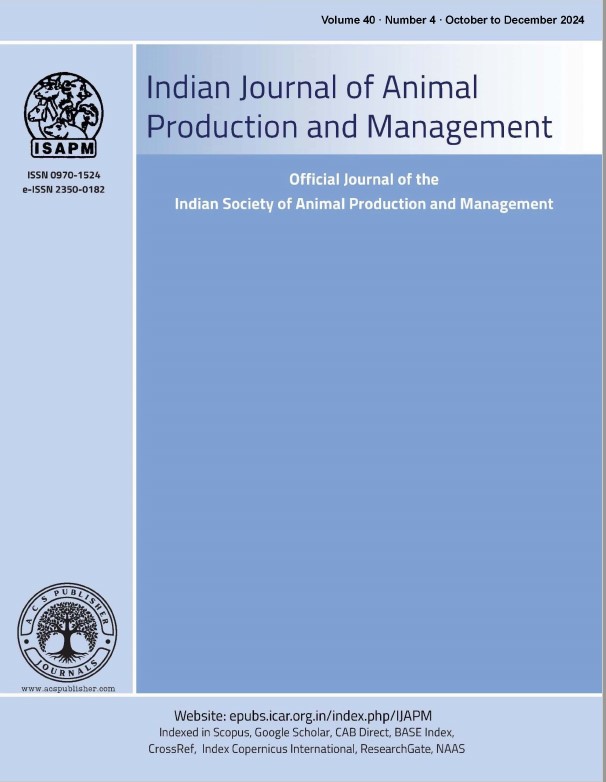Meat Species Identification in Chicken Blood Meal using Polymerase Chain Reaction Technique
DOI:
https://doi.org/10.48165/ijapm.2023.37.2.11Keywords:
cyt b gene, chicken, blood meal, polymerase chain reactionAbstract
A study was conducted to identify the species of chicken in high heat processed chicken secondary by-product comprising of poultry blood meal. A total of 30 samples of poultry blood meal were collected from different poultry processing plants in Tamil Nadu. Species specific polymerase chain reaction was employed to validate the meat species identification in heat processed secondary poultry by-products. Custom designed primer sequences of mitochondrial cyt b gene were utilised for the present study. The results revealed successful amplification of chicken species at 227 base pairs in samples of all the blood meal samples. Thus, it was concluded that species specific polymerase chain reaction technique can be effectively used in the screening of chicken meat species in different heat processed secondary by-products for quick and reliable results.
References
20th Livestock Census (2019). All India Report, Department of Animal Husbandry, Dairying and Fisheries, Ministry of Agriculture, Government of India, Krishi Bhawan, New Delhi.
Bellagamba, F., ValfreF., PanseriS., and MoretiV.M. 2003. Polymerase chain reaction-based analysis to detect terrestrial animal proteins in fish meal. Journal of Food Protection66(4): 682-685.
Chapman, D.D., AbercrombieD.L., DouadyC.J., PikitchE.K., Stanhope M.J. and ShivjiM.S. 2003. A streamlined, bi organelle, multiplex PCR approach to species identification: Application to global conservation and trade monitoring of the great white shark, Carcharodoncarharias. Conservation Genetics4: 415-425.
Doosti, A., AbbasiP and Ghorbani-DaliniS. 2011. Fraud identification in fishmeal using polymerase chain reaction (PCR). African Journal of Biotechnology10(59): 12762-
Jayathilakan, K., Sultana, K., Radhakrishna K and Bawa, A. S. 2012. Utilization of by products and waste materials from meat, poultry and fish processing industries: a review. Journal of Food Science and Technology 49(3): 278-293.
Lasekan, A., BakarF.A. and HashimD. 2012. Potential of chicken by-products as sources of useful biological resources. Waste Management 33(3): 552-565.
Matsunaga, T., ChikuniK., TanabeR., MuroyaS., ShibataK., YamadaJ and ShinmuraY. 1999. A quick and simple method for the identification of meat species and meat products by PCR assay. Meat Science 51(2): 143-148.
Narendra Babu, R., ThulasiG., Abraham RobinsonJ. J. and Appa RaoV.2014 Identification of buffalo meat by polymerase chain reaction. Journal of Cell and Tissue Research. 14(2): 4255-4258.
Nesic, K., PavlovicN and Jakic-DimicD. 2012. Presence of constituents of animal origin in feed. Proc. 6th Cent. European Congress of Food, Novi Sad, Serbia, 1543-
Prado, M., CasqueiroJ., IglesiasY., Cepeda. A and Barros-VelázquezJ. 2004. Application of a polymerase chain reaction (PCR) method as a complementary tool to microscopic analysis for the detection of
bones and other animal tissues in homemade animal meals. Journal of Science Food and Agriculture., 84(6): 505- 512.
Sindhura, A., Rao, V.A., Babu, R.N., Sudheer, K., Raziuddin, M. and Revathi, P., 2023. Molecular detection of beef adulteration in mutton by duplex polymerase chain reaction. Indian Journal of Small Ruminants (The) 29(1): 179-181.
Stephenson, F.H., 2010. Calculation in molecular biology and biotechnology, 2nd Ed. Academic Press. pp. 100-165.
Sudheer, K., Babu, R.N., Rao, V.A., Sindhura, A. and Govind, V., 2023. Molecular detection of meat species in primary by-Products of sheep and Goats. Indian Journal of Small Ruminants (The)29(1): 176-178.

